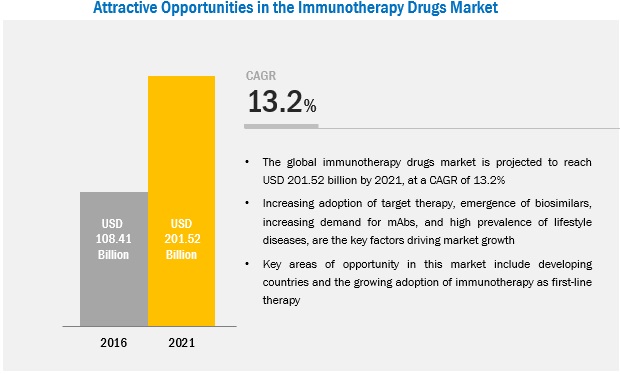The key driver of this market is an increase in the prevalence of chronic diseases and thriving demand and development of monoclonal antibodies (mAbs) and immunotherapy drugs. Immunotherapy refers to the treatment of a disease by enhancing, inducing, or suppressing an immune response.

Across the globe, the increasing prevalence of chronic diseases has become a major healthcare burden, as it affects people in high-income as well as low and middle-income countries (LMIC). According to a World Health Organization report, the fact that cancer led to an estimated 9.6 million deaths in 2018 firmly cements this claim. The organization further reported that around 70% of all deaths from cancer occur in LMICs.
Download Report Sample at:https://www.psmarketresearch.com/market-analysis/immunotherapy-drugs-market/report-sample
Furthermore, in a report of the International Agency for Research on Cancer (IARC) in 2018, it is estimated that around 18.1 million people were suffering from cancer globally, and the number is projected to reach 29.5 million by 2040. Similarly, a study conducted between 2005 and 2015 by the American Medical Association found that cancer cases increased by 33% during this period, of which 16.4% cases were due to aging population. Hence, the growing use of immunotherapy drugs to meet the increasing prevalence of chronic diseases in the elderly is driving the immunotherapy drugs market.
That same month, Allogene Therapeutics Inc. and Pfizer Inc. signed an asset contribution agreement to use Pfizer’s allogeneic CAR-T therapy, which is investigational immune cell therapy, for cancer. This agreement provided an opportunity for Pfizer Inc. to continue the development of the CAR-T therapy. Other players operating in the global immunotherapy drugs market, such as AstraZeneca PLC, F. Hoffmann-La Roche Ltd., Eli Lilly and Company, Sanofi, Medigene AG, AbbVie Inc, Johnson & Johnson, Amgen Inc., Merck & Co. Inc., GlaxoSmithKline plc, C. H. Boehringer Sohn AG & Co. KG, Novartis International AG, Takeda Pharmaceutical Company Limited, and Celgene Corporation, are taking similar steps.
Hence, as more people get affected by chronic diseases in the future, the immunotherapy drugs sector will continue to prosper.

 Log in with Facebook
Log in with Facebook 







